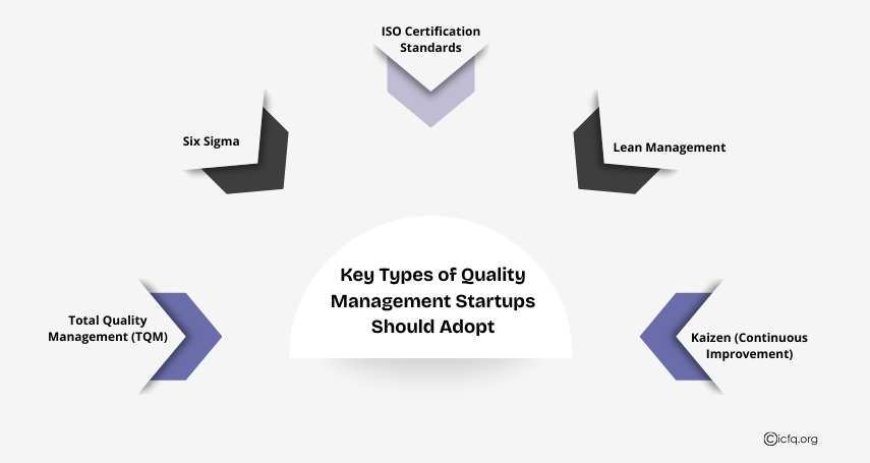How Startups Grow with Types of Quality Management
Learn how startups can grow by using quality management to work smarter, reduce mistakes, and earn customer trust from day one.

When I first started working with startups, I noticed a common challenge: growth isn’t just about having a great idea; it’s about ensuring everything you do is consistent and reliable. Many new businesses focus on innovation, but without a quality management system, even the best ideas can fail.
In my experience, startups that adopt structured approaches to Types of Quality Management, like Six Sigma, Lean, or ISO standards, grow faster and avoid costly mistakes. For example:
-
Companies using Six Sigma report up to 50% reduction in process errors.
-
Lean implementation can increase operational efficiency by 30–40%.
-
ISO-certified startups often see 20% faster customer acquisition due to improved credibility.
These methods help teams work smarter, reduce errors, and build trust with customers from the very beginning.
What Is Quality Management for Startups?
Quality Management for startups means setting up systems and practices that make sure every product or service meets customer expectations from the very beginning. Unlike large enterprises, startups often work with limited budgets and tight deadlines, so a quality management system acts as a guide to reduce mistakes, save costs, and build trust quickly.
It involves structured approaches such as Six Sigma, Total Quality Management (TQM), ISO standards, and Lean practices. These types of quality approaches are not just certifications; they are proven frameworks that help startups improve efficiency, reduce errors, and scale operations without losing focus on customer satisfaction.
Why Startups Struggle Without Quality Management
Startups often move fast to capture opportunities, but without proper quality control in management, this speed can lead to mistakes. Inconsistent processes, missed deadlines, and poor product standards create frustration for both customers and teams.
Without clear systems in place, costs rise due to rework, delays, and wasted resources. Customers may lose trust if products or services don’t meet expectations, making it difficult for startups to compete or scale.
In simple terms, a lack of quality standards can turn promising ideas into failed ventures by draining time, money, and reputation.
Key Types of Quality Management Startups Should Adopt

For startups, applying the right Types of Quality Management can be the difference between scaling smoothly and getting stuck with inefficiencies. Here are the most important types of quality that can help young businesses grow:
-
Total Quality Management (TQM)
TQM emphasizes continuous improvement across all business processes. For startups, it creates a culture where every team member takes responsibility for quality, leading to higher customer satisfaction and fewer errors.
-
Six Sigma
Six Sigma is a data-driven methodology that focuses on reducing defects and improving efficiency. Startups can use it to streamline operations, cut costs, and ensure products meet the highest standards from the beginning.
-
ISO Certification Standards
Obtaining ISO certifications (such as ISO 9001) signals reliability and consistency. For startups, it not only improves internal processes but also builds trust with investors, partners, and customers.
-
Lean Management
Lean focuses on eliminating waste and maximizing value with minimal resources. This is especially beneficial for startups operating with limited budgets and tight timelines.
-
Kaizen (Continuous Improvement)
Kaizen is about making small, ongoing changes that add up to big improvements over time. For startups, this approach helps maintain agility while steadily enhancing product quality and customer experience.
How Startups Grow with Types of Quality Management
Builds Customer Trust
-
Consistent quality ensures customer satisfaction.
-
Positive experiences increase loyalty and repeat business.
Reduces Operational Costs
-
Methods like Lean and Six Sigma eliminate waste and defects.
-
Startups save money by preventing rework and errors.
Improves Team Efficiency
-
Clear processes reduce confusion among employees.
-
Everyone knows their role in maintaining quality.
Enhances Market Reputation
-
Certifications like ISO 9001 build credibility.
-
Helps startups stand out against competitors.
Supports Scalability
-
Standardized processes make it easier to expand operations.
-
Growth becomes sustainable instead of chaotic.
Drives Innovation
-
Approaches like Kaizen encourage continuous improvement.
-
Small changes lead to long-term competitive advantage.
Practical Steps for Startups to Implement Quality Systems
-
Define Clear Quality Goals
Every startup must begin by setting specific quality objectives. Whether it’s reducing product defects, improving customer response time, or ensuring timely deliveries, these goals should align with the overall business vision.
-
Select the Right Quality Management Approach
Not every startup needs the same system. Some may benefit from ISO 9001 for standardization, while others might adopt Six Sigma or Kaizen for continuous improvement. Choosing the right framework ensures that efforts remain practical and achievable.
-
Document Core Processes
Clarity is key. By mapping workflows and writing down standard procedures, startups ensure consistency in operations. This also helps new employees adapt quickly and reduces dependency on individual knowledge.
-
Train and Empower the Team
Employees should understand why quality matters. Basic training in the chosen quality management system equips teams to follow best practices and take ownership of quality outcomes.
-
Track and Measure Quality Metrics
Data drives improvement. Startups should monitor indicators like defect rates, customer complaints, or service delays. Using simple dashboards or tracking tools makes it easier to spot problems early.
-
Leverage Technology
From project management apps to automated quality checks, affordable digital tools can reduce errors and save time. For startups, even small tech integrations can make a big difference.
For startups, growing a business is not only about new ideas, it’s also about keeping promises to customers. By using the right Types of Quality Management, startups can avoid mistakes, save money, and grow with confidence.
Methods like Six Sigma help improve efficiency, ISO standards build trust, and Lean practices make better use of resources. Each of these gives startups a clear way to improve and succeed for the long term while applying to quality standards and quality control in management.
Want to know which quality management system is right for your startup? Email us at [email protected] and let’s help you build growth on quality.




























